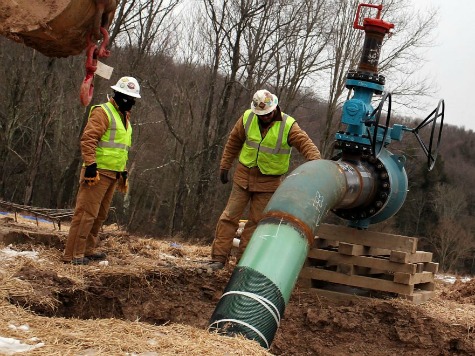When even half of Democrats favor building the Keystone XL pipeline, and almost two-thirds of Americans agree, what does that mean on the geopolitical level? Along with fracking, the pipeline offers the United States the opportunity to become energy independent, and that means big trouble for one man: Vladimir Putin.
A new survey by the Pew Research Center shows 61% of Americans are in favor of building the pipeline, including 84% of Republicans, 61% of independents and a startling 49% of Democrats. Among Democrats, 53% of those without a college degree support the pipeline; 39% with a college degree agree. A whopping 58% of Democratic men support the pipeline. A plurality of Democratic women also do, with 43% supporting it and 38% opposing it.
Ninety-four percent of Tea Party Republicans are in favor of the pipeline; 78% of non-Tea Party Republicans also support it. Ninety percent of GOP men vote aye, while 78% of GOP women agree. There are no real differences among GOP voters related to their relative wealth.
But American energy independence frightens Putin. As U.S. crude oil production reached a 24-year peak in 2013, with fracking in North Dakota and Texas responsible for 83% of U.S. production growth, Putin objected strenuously, claiming he opposed fracking for environmental reasons.
The U.S. is now the world’s leader in producing natural gas. Alexei Miller, chairman of the Russian energy giant Gazprom, said American shale gas production was “unprofitable” and the boom in the United States would ultimately be a “bubble.” But other Gazprom employees admitted that Gazprom was in trouble for spending hundreds of billions of dollars trying to increase production in the Arctic, hoping that the product would be sold to the United States, but with the advent of the natural gas boom in America, there was no need to buy Russian energy.
Europe has also reversed its position on fracking to cut its dependence on Moscow. Although France and Bulgaria (which gets its gas from Russia) banned fracking, the European Parliament passed legislation exempting shale gas projects from tighter regulation. Gordon Moffatt, director general of the European steel lobby Eurofer, told the heads of various European countries:
Given the absolute necessity for Europe to diversify its sources of supply of gas and to find solutions to the huge energy price differential with its main competitors, we see no alternative but to proceed as rapidly as possible with shale gas exploitation as part of the energy mix in Europe while retaining all the precautions necessary in pursuing this approach.
As The Daily Beast reported, “As an article on ‘the geopolitical consequences of the shale revolution’ in the current issue of Foreign Affairs points out, of all the governments hit hard by the new American power in energy markets, Moscow has the most to lose.”
In November of 2013, Ukraine signed a $10 billion deal with Chevron to look for shale gas; this followed a deal Ukraine had made with Royal Dutch Shell. President Viktor Yanukovych claimed Ukraine would thus “have full sufficiency in gas by 2020 and, under an optimistic scenario, even enable us to export energy.” Almost immediately after that, Yanukovych had a deal in place with the European Union, but Putin roared that he had a deal giving Ukraine $15 billion in loans and cheap gas. Yanukovych caved.
Russia’s economy is dependent on selling gas and oil; 76% of Russian gas exported goes to Germany, Turkey, Italy, France, Britain as well as other places in Europe.

COMMENTS
Please let us know if you're having issues with commenting.